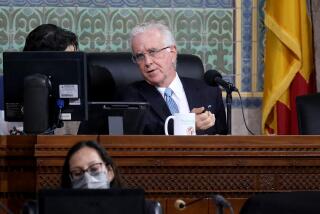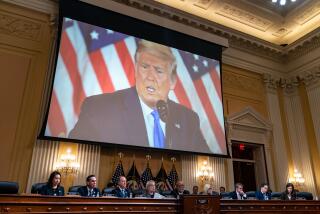Clinton Bipartisan Panel Idea Called a Ploy : Politics: House Speaker denounces the proposal on campaign, lobby reform. GOP leaders see it as bid to wrest the advantage and initiative from their party.
- Share via
WASHINGTON — President Clinton moved quickly Friday to seize a political opportunity presented by his recent appearance with House Speaker Newt Gingrich (R-Ga.) in New Hampshire, outlining his vision of a bipartisan commission that would draft political reform legislation and send it to Congress for a “yes” or “no” vote.
The White House initiative, which followed a remarkably civil debate in New Hampshire between the two sparring political leaders, was denounced immediately by Gingrich as political grandstanding.
In a letter sent Friday to Gingrich and released almost simultaneously to the press in Halifax, Canada, where Clinton is meeting with leaders of the world’s economic powers, the President proposed fashioning a commission of Republicans and Democrats to “take a fresh look” at “all the issues of political reform, including campaign finance reform and lobby reform.”
The commission then would submit a legislative proposal, through the President, to Congress, which could vote it down--a politically risky move in an environment of voter disgruntlement--or approve it without amendment.
“This proposal offers the best chance in a generation to break through the stalemate between the parties that has blocked progress for reform,” Clinton wrote to the House Speaker.
Gingrich, who has been wary of a commitment to reform financing of congressional campaigns just as the GOP has won control of Congress, was deeply piqued by what one aide called “a campaign-related stunt” masterminded by Clinton adviser Dick Morris for the political benefit of the White House.
“We’re going to try to get this process restarted on a bipartisan basis and assume the handling of this was due to the strange weather in Halifax,” Gingrich spokesman Tony Blankley said. “It’s too important an issue to be turned into a political football.”
Senate Majority Leader Bob Dole (R-Kan.), who is being invited into the process by the White House, according to Clinton Press Secretary Mike McCurry, had not seen the letter late Friday. Dole’s spokesman said that he was not available for comment.
White House aides said that Clinton modeled his idea for a bipartisan commission on the panel established in 1991 to consider the politically volatile issue of how many and which military installations to close. Like that commission, members of the panel proposed by Clinton would be evenly divided between Republicans and Democrats.
The President, the House Speaker and the Senate majority leader each would name two members to the panel, and minority leaders in the House and Senate each would name one member.
Saying “the American people want to know that we will act during this Congress,” Clinton suggested that the commission be given a firm deadline of Feb. 1, 1996, to draw up a detailed legislative proposal and send it to the President. That, he wrote, would allow the issue to be settled “before the electoral season begins in the summer of 1996.”
But congressional Republicans clearly saw Clinton’s move as a political ploy to wrest both the advantage and the initiative from GOP leaders on Capitol Hill.
“They faxed this over to us instantaneously with its release to the media,” Gingrich spokesman Blankley said. “Everyone in Washington knows that is not the way to launch a good-faith bipartisan effort.”
*
Noting that Gingrich is interested in a commission that would explore “the totality of politics and money” in federal elections, Blankley suggested that Clinton’s narrow focus on lobbying and campaign finance in congressional elections could be designed to put lawmakers--already unpopular with the public--on the defensive while leaving Clinton in the clear.
GOP leaders in the House and Senate have been wary of undertaking sweeping reforms that would place new restrictions on lobbying, gifts to lawmakers and campaign finance, mostly placing those issues at the end of a long list of other more pressing legislative priorities.
But less senior members of the House and Senate, including a number of freshmen lawmakers, have continued to see such reform as central to the mandate that their constituencies gave them. The result has been a behind-the-scenes war of wills between influential freshmen and more senior legislators on these issues.
In the House, a bipartisan reform team of nine lawmakers--which organized itself in February, well before last Sunday’s agreement between Clinton and Gingrich to form a bipartisan commission--already has begun generating proposals for the commission.
Among those proposals is a campaign finance reform act now in final drafting stage. An early draft of the group’s proposal would bar candidates from receiving more than 50% of their total contributions per cycle from political action committees and no more than 50% from out of state.
The proposal would make exceptions to those strictures only in cases where candidates contribute more than $100,000 of personal funds to their own campaign.
The preliminary version also would prohibit “bundling” of campaign contributions by PACs, trade associations, lobbyists, corporations, political parties, limited partners and foreign agents. And it would prohibit contributions by leadership PACs, in which lawmakers in safe seats pool their surplus campaign funds and direct them to other races.
More to Read
Get the L.A. Times Politics newsletter
Deeply reported insights into legislation, politics and policy from Sacramento, Washington and beyond. In your inbox twice per week.
You may occasionally receive promotional content from the Los Angeles Times.












